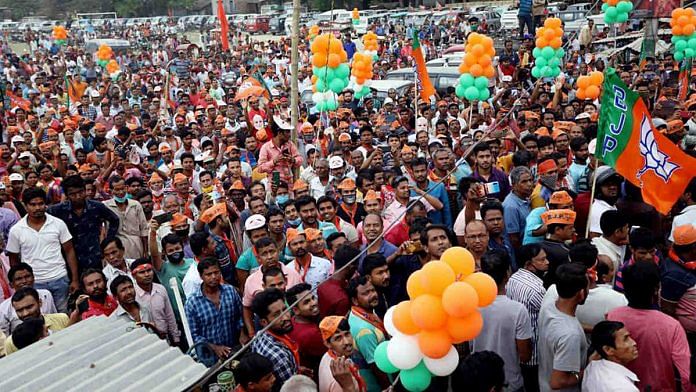New Delhi/Kolkata: The Modi government’s failure to frame and notify the rules of the Citizenship (Amendment) Act seems to have cost the Bharatiya Janata Party (BJP) dearly in the West Bengal elections, with the Trinamool Congress getting the better of the saffron party in seats dominated by the Matuas, a minority Dalit Hindu group with roots in Bangladesh.
Of the 32 seats across North 24 Parganas and Nadia where the Matuas are the deciding or dominating factor, the BJP has won 12, while 20 have gone to the Trinamool Congress.
The Rajbanshis, a numerically smaller group that is partly comprised of Hindu refugees from Bangladesh, however, stood by the BJP, which won nine of the 11 seats dominated by this Dalit community in North Bengal.
This, experts say, could be attributed to a “rivalry” within the community, between groups indigenous to Bengal and those who have come in from across the border. Both factions want the CAA to be implemented soon but for different reasons, they add.
According to Roop Kumar Burman, a professor at Jadavpur University and an expert on Rajbanshi population and politics, the Rajbanshis of North Bengal include an indigenous section and a group of Bangladeshi Hindu refugees.
“The Rajbanshis and other Namasudra groups that form a population of at least 40 lakh in the districts of Jalpaiguri, Coochbehar and Darjeeling are divided into two groups. The indigenous groups want the refugee ones to be identified under the CAA and the NRC (National Register of Citizens). The refugee group wants the CAA for citizenship,” he added.
“There is a rivalry among them… So, the whole Rajbanshi population that has been with the BJP for the past six-seven years voted for them as a block,” he said.
It is a complicated calculation that the BJP has done well, Burman added.
The Trinamool Congress emerged a clear winner in the 2021 West Bengal assembly elections, the results of which were announced Sunday. The BJP was the second-largest party.
Also Read: This is how BJP plans to pacify key Matua community at Amit Shah’s Bengal rally today
CAA delayed
The Matuas came to India during the Partition and over the following years. There are no exact figures available but the Matuas are estimated to make up close to 1 per cent of West Bengal’s entire population. They are estimated to have a presence across at least six parliamentary constituencies.
In this election, the BJP won in constituencies such as Gaighata, Krishnanagar Uttar, Bongaon Uttar, Bongaon Dakhsin, Ranaghat, and lost in Habra, Ashoknagar, Swarupnagar, and Madhyamgram, among others, across Nadia and North 24 Parganas districts.
The election results in the pockets where the Matuas play a deciding role appear to be a reflection of resentment in the community over the delay in the implementation of the CAA, which is seen by them as a means to realise their decades-long demand for permanent citizenship.
The CAA promises to ease Indian citizenship for members of six minority communities — Hindu, Sikh, Buddhist, Jain, Parsi and Christian — from the Muslim-majority nations of Pakistan, Bangladesh and Afghanistan who arrived in India before 31 December 2014.
It was the BJP’s pitch for CAA that is believed to have led to the election of Santanu Thakur — member of a prominent Matua family — in the 2019 Lok Sabha polls.
In 2019, the BJP had a lead in over 19 assembly constituencies across Nadia and North 24 Parganas districts where Matuas influence the vote. The BJP won 18 seats in Bengal in 2019, up from two in 2014.
“The Matua community had played a significant role in the BJP’s success in the 2019 Lok Sabha elections. Their votes had helped the BJP get a number of seats, especially in Cooch Behar, North Malda, Burdwan-Durgapur, and other regions,” said a senior BJP leader.
The CAA was passed by the Lok Sabha on 9 December 2019 and by the Rajya Sabha on 11 December 2019. It came into force on 10 January 2020, but the rules for implementation are still being drawn up.
The delay in the implementation of the CAA has stoked much resentment in the Matua heartland of Thakurnagar, and other areas.
‘In a bind’
During his campaign rallies in Bengal, Union Home Minister Amit Shah attributed the delay to the Covid pandemic and committed to implement it once the party was voted to power in the state.
The delay in the passage of the CAA can also be attributed to the fact that in Assam, where the BJP bid for re-election this time and succeeded, many indigenous communities have opposed the law.
“This put the BJP in a bind and it was decided that it would not find a mention in the Assam manifesto even as the BJP went all out to highlight it in West Bengal,” said a second senior BJP leader.
Apart from making it a part of the BJP manifesto, Shah also raised the issue in rallies, promising to pass it in the first cabinet meeting itself.
In March, PM Modi also met members of the community during his visit to Bangladesh.
(Edited by Sunanda Ranjan)
Also Read: Why Mamata and BJP are battling over this little known Bengal minority community



